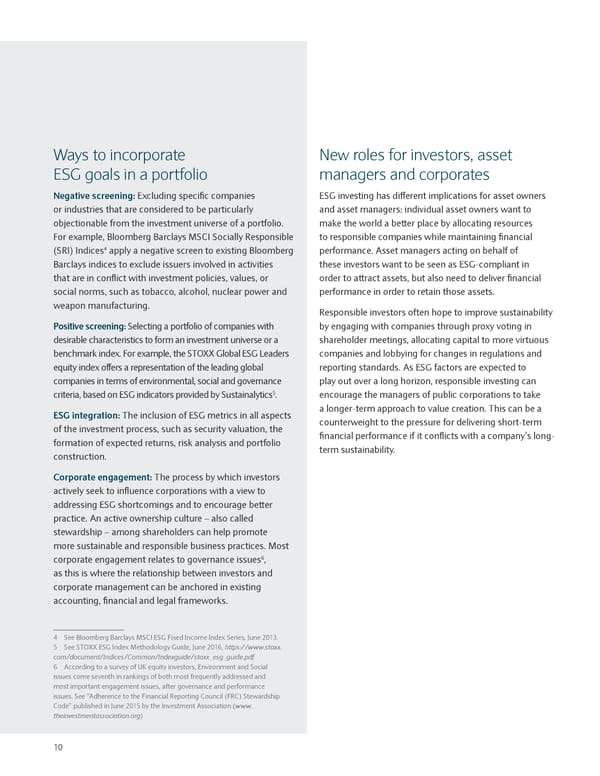Ways to incorporate New roles for investors, asset ESG goals in a portfolio managers and corporates Negative screening: Excluding specific companies ESG investing has different implications for asset owners or industries that are considered to be particularly and asset managers: individual asset owners want to objectionable from the investment universe of a portfolio. make the world a better place by allocating resources For example, Bloomberg Barclays MSCI Socially Responsible to responsible companies while maintaining financial 4 apply a negative screen to existing Bloomberg (SRI) Indices performance. Asset managers acting on behalf of Barclays indices to exclude issuers involved in activities these investors want to be seen as ESG-compliant in that are in conflict with investment policies, values, or order to attract assets, but also need to deliver financial social norms, such as tobacco, alcohol, nuclear power and performance in order to retain those assets. weapon manufacturing. Responsible investors often hope to improve sustainability Positive screening: Selecting a portfolio of companies with by engaging with companies through proxy voting in desirable characteristics to form an investment universe or a shareholder meetings, allocating capital to more virtuous benchmark index. For example, the STOXX Global ESG Leaders companies and lobbying for changes in regulations and equity index offers a representation of the leading global reporting standards. As ESG factors are expected to companies in terms of environmental, social and governance play out over a long horizon, responsible investing can 5 criteria, based on ESG indicators provided by Sustainalytics . encourage the managers of public corporations to take ESG integration: The inclusion of ESG metrics in all aspects a longer-term approach to value creation. This can be a of the investment process, such as security valuation, the counterweight to the pressure for delivering short-term formation of expected returns, risk analysis and portfolio financial performance if it conflicts with a company’s long- construction. term sustainability. Corporate engagement: The process by which investors actively seek to influence corporations with a view to addressing ESG shortcomings and to encourage better practice. An active ownership culture – also called stewardship – among shareholders can help promote more sustainable and responsible business practices. Most 6, corporate engagement relates to governance issues as this is where the relationship between investors and corporate management can be anchored in existing accounting, financial and legal frameworks. 4 See Bloomberg Barclays MSCI ESG Fixed Income Index Series, June 2013. 5 See STOXX ESG Index Methodology Guide, June 2016, https://www.stoxx. com/document/Indices/Common/Indexguide/stoxx_esg_guide.pdf 6 According to a survey of UK equity investors, Environment and Social issues come seventh in rankings of both most frequently addressed and most important engagement issues, after governance and performance issues. See “Adherence to the Financial Reporting Council (FRC) Stewardship Code” published in June 2015 by the Investment Association (www. theinvestmentassociation.org) 10
 Sustainable Investing and Bond Returns Page 10 Page 12
Sustainable Investing and Bond Returns Page 10 Page 12